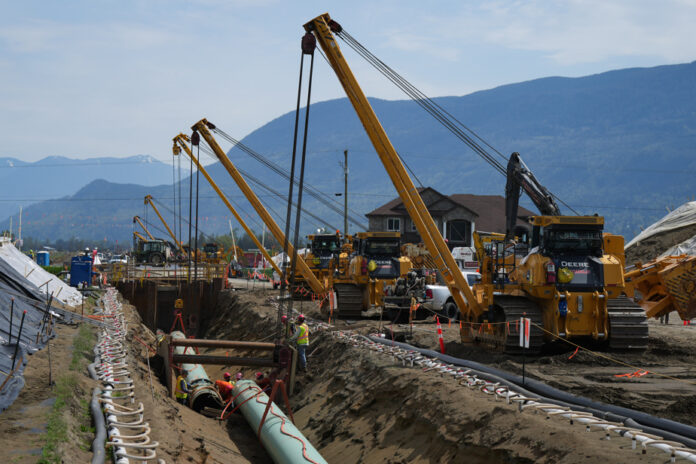(Calgary) The company building the Trans Mountain pipeline is trying to demonstrate that Canadian oil companies should charge higher tolls due to the increasing costs of its pipeline project.
Trans Mountain says in new regulatory documents filed Friday that the increased costs of the pipeline expansion project have been “reasonable and justified.”
The Crown corporation had successfully requested authorization to impose higher fees on oil companies once the pipeline expansion is operational, but only on an interim basis until the Canada Energy Regulator render a decision.
Trans Mountain wants to charge a benchmark toll that would be nearly double the amount estimated in 2017, in an effort to recoup some of the growing capital costs of its pipeline expansion project.
The cost estimate for the project, more than 97% complete, increased from 7.4 billion in 2017 to 30.9 billion.
In a written statement, Trans Mountain says its project has been affected by “extraordinary” factors, including evolving compliance requirements, accommodation measures for Indigenous groups, stakeholder engagement and regulatory requirements. compensation, extreme weather conditions and the COVID-19 pandemic. “These requirements drive up project costs. »
The Trans Mountain pipeline, purchased by the federal government in 2018, is the only one that goes to Canada’s west coast. Its nearly completed expansion project will increase the pipeline’s capacity by 590,000 barrels per day to a total of 890,000 barrels per day, improving Canadian oil companies’ access to export markets.
Trans Mountain claims it will assume 70% of the project’s cost overruns. Because of this overrun, the Crown corporation believes it will generate only “modest returns” during the first years of operation of the expanded pipeline.
The company warns that lower tolls “could impact its ability to meet its financial obligations.”
In a separate regulatory filing last week, Trans Mountain resubmitted a new application to modify its pipeline, after its request had previously been denied. The company wants to change the size of the pipe for a section of the project in British Columbia, due to soil characteristics in that segment that make construction conditions difficult.
If the exemption is not granted, the company fears that the completion of the project will be delayed by two years.















